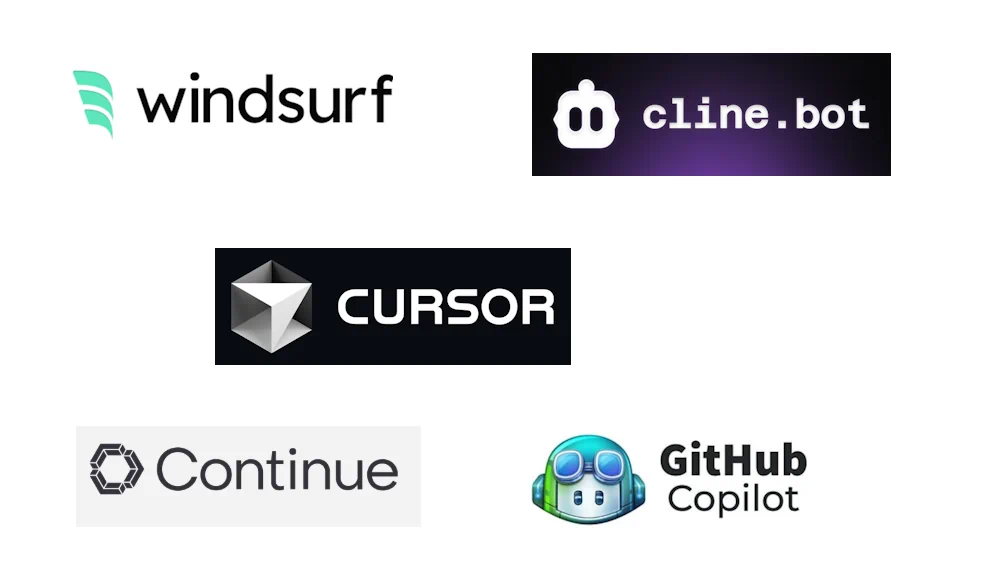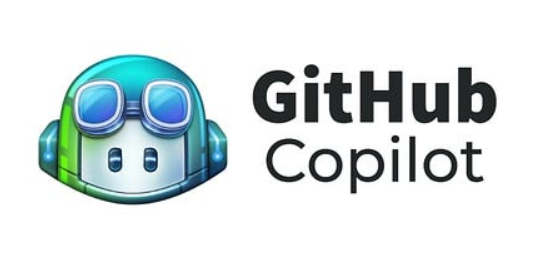Comparing Popular AI Copilot Tools: Cline, Cursor, Windsurf and Gihub Copilot
In the rapidly evolving landscape of software development, Artificial Intelligence (AI) is increasingly integrated into Integrated Development Environments (IDEs). These AI-powered IDEs promise to boost productivity, streamline workflows, and enhance the coding experience.

This article dives deep into four prominent AI IDEs: Windsurf, Cursor, Cline, and GitHub Copilot. We'll compare their features, pricing (as of April 2025), performance, and user experience. Whether you're a solo developer, part of a large team, or just starting, this guide aims to help you select the ideal tool for your current and future projects.
1. Windsurf:
Windsurf, developed by Codeium, is a relatively new contender gaining traction in the AI IDE space. It positions itself as a lightweight, cost-effective alternative to more established players like Cursor and GitHub Copilot.

Highlights
- AI Flow Paradigm: Windsurf moves beyond simple chat interactions, offering a multi-step, context-aware workflow designed to understand your project's structure more deeply.
- Tool Integration: Integrates with existing developer tools for tasks like file management and command execution. It also supports API calls for creating advanced, custom workflows.
- Affordable Pricing: Offers a free tier with basic features. Pro plans for advanced functionalities start at $15 per month.
See a detailed overview: Windsurf
User Experience
Windsurf emphasizes real-time collaboration, allowing developers to work together within the IDE without external tools. Its user interface is generally considered intuitive, facilitating a smoother onboarding process for new users.
Pros
- Contextual Understanding: Excels at maintaining project context, proving beneficial for complex operations like large-scale refactoring or debugging.
- Cost-Effective: A strong option for independent developers or small teams operating on a limited budget.
Cons
- Performance: While agile, its code completion speed might lag slightly behind competitors like Cursor in some scenarios.
- Ecosystem Maturity: As a newer tool, its plugin support and community resources are still growing compared to more established IDEs.
2. Cline:
For developers seeking a free and open-source solution, Cline presents a compelling option. As a VS Code plugin, it integrates with various AI models (like DeepSeek) to offer a capable AI coding experience without proprietary constraints.

Highlights
- Open-Source & Free: Completely free to use, making it highly accessible.
- Transparency: Unlike closed-source tools, code modifications made by Cline can be inspected, offering users greater control and understanding.
- Pricing: While the core functionality is free, premium features are available via plans starting at $10 per month (check current offerings). (Note: Source mentioned both free and $10/month - clarifying the distinction)
Find out more: Learn about Cline
User Experience
Cline is noted for its performance, attracting developers who prioritize speed. Its customizable interface allows tailoring the environment to individual preferences and coding styles.
Pros
- Cost-Effective: No mandatory subscription fees for core features.
- Customizable: Open nature allows for tweaking and adapting to specific needs.
Cons
- Feature Set: May lack some of the highly advanced AI capabilities found in premium tools like Cursor or Windsurf.
- Setup Complexity: Configuring backend AI models (like setting up API keys for DeepSeek) might be challenging for users less familiar with these processes.
3. Cursor:
Cursor is frequently regarded as a leading AI IDE. Built upon the familiar foundation of Visual Studio Code (VS Code), it merges a popular editor's usability with advanced AI capabilities.

Highlights
- Composer Mode: A standout feature allowing Cursor to comprehend and work with entire projects, not just isolated files, acting somewhat like an AI project assistant.
- Team Collaboration: Provides robust tools tailored for team environments, including features for code reviews and seamless version control integration.
- Advanced Refactoring: Its AI can assist in rewriting significant portions or even entire codebases, valuable for modernizing legacy projects.
- Pricing: Offers a free "Hobby" tier with limitations. Pro plans commence at $20 per month.
Explore Cursor's capabilities: Discover Cursor features
User Experience
Cursor earns praise for its intelligent and fast code completion, significantly reducing coding time by accurately anticipating developer needs. Its natural language processing capabilities allow users to issue commands in plain English, which appeals to many.
Pros
- Performance: Delivers notably fast and accurate code completion.
- Mature Ecosystem: Leverages the extensive VS Code ecosystem, supporting a vast library of extensions and plugins.
Cons
- Price Point: At $20/month for Pro, it's positioned at the higher end of the pricing spectrum for AI assistants.
- Complexity: The breadth of its advanced features might present a steeper learning curve for beginners.
4. GitHub Copilot:
GitHub Copilot is arguably the most widely recognized AI coding assistant. Developed by GitHub in partnership with OpenAI, it utilizes machine learning models to provide contextual code suggestions within numerous popular code editors.

Highlights
- Seamless Integration: Works across a wide array of IDEs, including VS Code, JetBrains IDEs (IntelliJ, PyCharm, etc.), Visual Studio, and Neovim.
- Commit Summaries: Can automatically generate descriptive commit messages based on code changes, speeding up the version control process.
- Affordable Pricing: Offers a free tier (often for students and open-source maintainers) and standard plans starting around $10 per month or $100 per year for individuals. Business plans are also available.
Installation guide: Install GitHub Copilot in Visual Studio
User Experience
Being an established product, GitHub Copilot benefits from extensive documentation, community support, and a large user base. Its tight integration into existing IDEs is a major convenience factor for developers who prefer not to switch editors.
Pros
- Reliability: Copilot's code suggestions are generally accurate and context-aware.
- Community Support: Easy to find help, tutorials, and resources due to its popularity.
- Broad IDE Support: Works where many developers already are.
Cons
- Limited Project Awareness: Compared to tools like Cursor, Copilot primarily focuses on the current file and context, potentially struggling with project-wide refactoring tasks.
- Subscription Cost: While affordable, it adds another subscription, especially if users already pay for GitHub Pro or other services.
At a Glance: AI IDE Comparison
Here's a comparative overview of Windsurf, Cursor, Cline, and GitHub Copilot based on several key attributes (Pricing as of April 2025):
| Feature | Windsurf | Cursor | Cline | GitHub Copilot |
|---|---|---|---|---|
| Developer / Origin | Codeium | Cursor Team (Built on VS Code) | Open Source Community | GitHub / OpenAI |
| Core Concept | AI Flow Paradigm, Context-aware | VS Code Base + Advanced Project AI | Open-Source VS Code Plugin + External Models | AI Pair Programmer / Code Suggestions |
| Standout Feature(s) | AI Flow, Tool Integration, Collaboration | Composer Mode, Advanced Refactoring, Team Tools | Open Source, Transparency, Customizability | Seamless IDE Integration, Commit Summaries |
| Free Tier Available? | Yes (Basic features) | Yes ("Hobby" tier, limited) | Yes (Core functionality) | Yes (Limited - Students, OSS maintainers) |
| Pro Plan Start Price | $15 / month | $20 / month | $10 / month (Premium Features) | ~$10 / month (Individual) |
| Key Strength(s) | Contextual Understanding, Cost-Effective | Performance, Ecosystem, Project-level AI | Free/Cost-Effective, Customizable, Open Source | Reliability, Community, Broad Integration |
| Key Weakness(es) | Slower speed vs Cursor, Smaller Ecosystem | Pricey, Potential Complexity | Fewer advanced features, Setup complexity | Limited Project Awareness, Adds Subscription |
| Ideal User / Use Case | Budget-conscious, Small teams | Teams, Enterprises, Power users | Budget-conscious, Open Source fans, Customizers | General use, Existing IDE integration |
The Verdict: Which AI IDE Should You Choose?
The "best" AI IDE depends heavily on your specific requirements, budget, and workflow:
- For Budget-Conscious Developers & Open Source Enthusiasts: Cline offer great value. Cline's openness is a plus if you prefer free tools, while Windsurf provides more integrated features at a reasonable price.
- For Teams, Enterprises, and Power Users: Cursor ($20/month Pro) stands out with its advanced project-level understanding, collaboration features, and top-tier performance, justifying the higher cost for demanding workflows.
- For General Use & Maximum Compatibility: GitHub Copilot ($10/month) offers a solid balance of features, reliability, and affordability, integrating directly into most popular IDEs.
Final Thoughts
Choosing the right AI-powered IDE or assistant can significantly impact your productivity. While the decision might seem complex given the quality options available, each tool discussed – Windsurf, Cursor, Cline, and GitHub Copilot – brings unique strengths to the table.
If you're uncertain, take advantage of the free tiers or trial periods offered by most of these tools. Experimenting firsthand is the best way to determine which AI assistant best aligns with your coding style and project needs. Whether you prioritize Windsurf's agility, Cursor's power, Cline's openness, or Copilot's ubiquity, there's likely an AI coding companion ready to enhance your development process